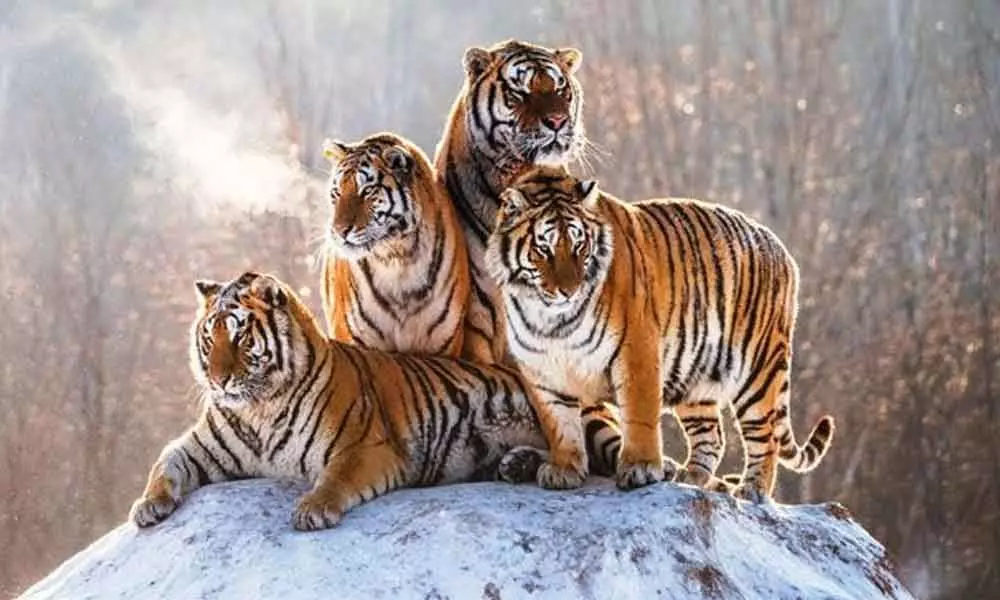Live
- JD-U criticises Pappu Yadav for receiving threatening calls
- INST scientists develop anti-counterfeiting ink to curb document duplication
- 62 dead in flash floods in eastern Spain
- India to face Malaysia in Hyderabad on November 18 for International Friendly
- Militants will get killed as long as they continue to infiltrate: Farooq Abdullah
- PM Modi, HM Shah, CM Yogi among top BJP bigwigs to hold over 170 poll rallies in Maharashtra
- AAP protests against FCI's slow procurement of paddy from Punjab
- Lakshmi Puja 2024: Complete Guide to Diwali Rituals for Prosperity and Good Fortune
- AP govt. appoints BR Naidu as new chairman of TTD
- Odisha CM announces Rs 6 lakh compensation for metro tunnel victims
Just In
Wildlife population declined by 68 per cent since 1970: WWF


Wildlife population declined by 68 per cent since 1970
Global populations of mammals, birds, amphibians, reptiles and fish have suffered an average two-thirds' decline in less than half a century.
New Delhi: Global populations of mammals, birds, amphibians, reptiles and fish have suffered an average two-thirds' decline in less than half a century.
This has contributed to environmental degradation, leading to the emergence of zoonotic diseases such as Covid-19, according to WWF's Living Planet Report, 2020.
The Living Planet Index (LPI) shows that factors believed to increase the planet's vulnerability to pandemics -- including land-use change and the use and trade of wildlife -- were also some of the drivers behind the 68 per cent average decline in global vertebrate species population between 1970 and 2016.
"The Living Planet Report, 2020 underlines how humanity's increasing destruction of nature is having catastrophic impact not only on wildlife populations but also on human health and all aspects of our lives," said Marco Lambertini, Director General, WWF International.
"We can't ignore the evidence -- the serious decline in wildlife species populations are an indicator that nature is unravelling and that our planet is flashing red-warning signs of system failure. From the fish in our oceans and rivers to bees which play a crucial role in our agricultural production, the decline of wildlife affects nutrition, food security and livelihoods of billions of people," he added.
In the midst of a global pandemic, it is now more important than ever to take unprecedented and coordinated global action to halt and start to reverse the loss of biodiversity and wildlife populations across the globe by the end of the decade and protect our future health and livelihoods.
The Living Planet Report, 2020 presents a comprehensive overview of the state of our natural world through the LPI which tracks trends in global wildlife abundance with contributions from more than 125 experts from around the world.
It shows that the main cause of the dramatic decline in species populations on land observed in the LPI is habitat loss and degradation, including deforestation driven by how we as a humanity produce food. The LPI, which tracked almost 21,000 populations of more than 4,000 vertebrate species between 1970 and 2016, also shows that wildlife populations found in freshwater habitats have suffered a decline of 84 per cent -- the starkest average population decline in any biome equivalent to 4 per cent per year since 1970.
One example is the spawning population of the Chinese sturgeon in China's Yangtze river which declined by 97 per cent between 1982 and 2015 due to the damming of the waterway.
Based on a paper, bending the curve of terrestrial biodiversity needs an integrated strategy co-authored by WWF and more than 40 NGOs and academic institutions and published in 'Nature' on Saturday, the LPR, 2020 also includes pioneering modelling which shows that without further efforts to counteract habitat loss and degradation, global biodiversity will continue to decline.
The modelling makes clear that stabilizing and reversing the loss of nature caused by humans' destruction of natural habitats will only be possible if bolder, more ambitious conservation efforts are embraced and transformational changes made to the way we produce and consume food. Changes needed include making food production and trade more efficient and ecologically sustainable, reducing waste and favouring healthier and more environment-friendly diets.
The research shows that implementing these measures together rather than in isolation will allow the world to rapidly alleviate pressures on wildlife habitats. The modelling also indicates that if the world carries on with "business as usual", rates of biodiversity loss seen since 1970 will continue over the coming years.
"The focus of Living Planet Report, 2020 is to reiterate a scientific case for the urgent action we need to protect and restore nature and biodiversity," said Ravi Singh, Secretary General and CEO, WWF India.
"This year has seen catastrophic events across the country and the world -- forest fires, cyclones, locust plagues and the Covid-19 pandemic. These events have shaken the world's environmental conscience and forced us to rethink and reset our relationship with nature," he added.

© 2024 Hyderabad Media House Limited/The Hans India. All rights reserved. Powered by hocalwire.com






